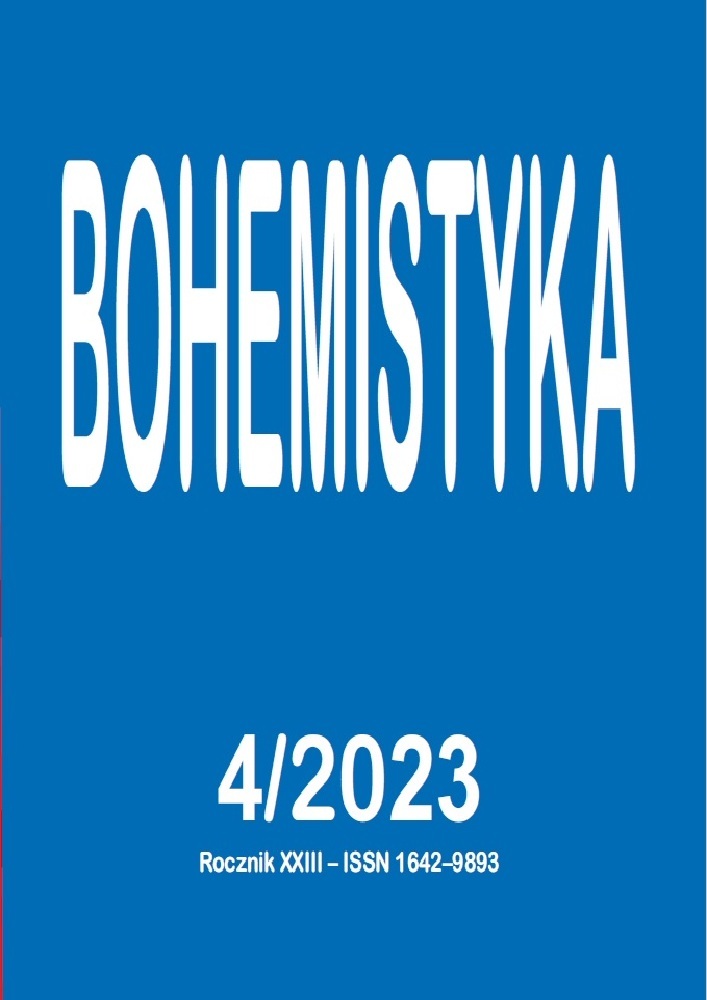Abstrakt
The paper focuses on Latin influence on the properties of the Old and Middle Czech lexical items zajisté and pak. According to the previous diachronic syntactic studies, these expressions were able to copy the word order of some Latin particles and extract constituents of nominal phrase in Old Czech, i. e. follow the typically Latin word order pattern (see Navrátilová 2017, 2018). The aim is to introduce their functions and the developement of their word order in Old and Middle Czech in comparison with the properties of their Latin equivalents. The analysis is based on the data excerpted from the corpora of Old and Middle Czech texts (Staročeská textová banka, Středněčeská textová banka) and from biblical text of the Gospel of Luke in four translations representing various stages of older Czech (Olomouc Bible, Miller’s Bible, Melantrich’s Bible, St. Wenceslas Bible) and in their Latin pretext (Vulgate).
Bibliografia
Danckaert Lieven, 2014, Quidem as a marker of emphatic polarity. „Transactions of the Philological Society”, 112(1), s. 97–138. DOI: https://doi.org/10.1111/1467-968X.12009
Dewitt Norman W., 1938, The semantics of Latin particles. „The Classical Journal”, 33(8), s. 450–456.
Ghezzi Chiara, Molinelli Piera (eds.), 2014, Discourse and pragmatic markers from Latin to the Romance languages. Oxford: Oxford University Press. DOI: https://doi.org/10.1093/acprof:oso/9780199681600.001.0001
Grepl Miroslav, Karlík Petr., 1998, Skladba češtiny. Olomouc: Votobia. Velká řada (Votobia).
Grepl Miroslav, Nekula Marek, 2002, Částice. In: Petr Karlík, Marek Nekula, Jana Pleskalová (eds.). Encyklopedický slovník češtiny. Praha: Nakladatelství Lidové noviny.
Grepl Miroslav, Nekula Marek, 2017, Epistémická částice. In: In: Petr Karlík, Marek Nekula, Jana Pleskalová (eds.). CzechEncy – Nový encyklopedický slovník češtiny. Online: https://www.czechency.org/slovnik/EPISTÉMICKÁČÁSTICE [cit. 2021-10-03].
Hajičová Eva, 1995, Postavení rematizátorů v aktuálním členění věty. „Slovo a slovesnost”, 56(4), s. 241–251.
Havránek Bohuslav, 1980, Vývoj českého spisovného jazyka. Praha: Státní pedagogické nakladatelství.
Heine Bernd, 2003, Grammaticalization. In: Brian D. Joseph, Richard D. Janda (eds.), The handbook of historical linguistics. Malden: Blackwell Publishing, s. 575–601. DOI: https://doi.org/10.1111/b.9781405127479.2004.00020.x
Hirschová Milada, 2013, Pragmatika v češtině. 2. vyd., v Karolinu 1., dopl. Praha: Karolinum.
Kosek Pavel, 2011, Enklitika v češtině barokní doby. Brno: Host.
Ježová Martina, 2021, Vliv latiny na užití částic ve staré a střední češtině. Diplomová práce. Brno: Masarykova univerzita, Filozofická fakulta. Vedoucí práce Olga Navrátilová. Online: https://is.muni.cz/th/etj7o [cit. 2022-02-16].
Kosek Pavel, Čech Radek, Navrátilová Olga, 2018, Starobylá dativní enklitika mi, si, ti ve staročeské bibli 1. redakce. In: Petr Malčík (ed.), Vesper Slavicus: Sborník k nedožitým devadesátinám prof. Radoslava Večerky. Praha: Nakladatelství Lidové noviny, s. 137–151.
Kroon Caroline, 2011, Latin particles and the grammar of discourse. In: James Clarckson (ed.). A companion to the Latin language. Malden: Blackwell Publishing, s. 176–195. DOI: https://doi.org/10.1002/9781444343397.ch12
Kyas Vladimír, 1997, Česká bible v dějinách národního písemnictví. Praha: Vyšehrad. Studium (Vyšehrad).
Navrátilová Olga, 2017, Interpozice ve staré češtině. „Naše řeč”, 100(3), s. 139–147.
Navrátilová Olga, 2018, Slovosled posesivních zájmen ve staré češtině. Brno: Masarykova univerzita. Spisy Filozofické fakulty Masarykovy univerzity. DOI: https://doi.org/10.5817/CZ.MUNI.M210-9074-2018
Pinkster Harm, 2015, The Oxford Latin syntax. Vol. 1. The simple clause. Oxford: Oxford University Press. DOI: https://doi.org/10.1093/acprof:oso/9780199283613.003.0001
Rosén Hannah, 2009, Coherence, sentence modification, and sentence-part modification – the contribution of particles. In: Philip Baldi, Pierluigi Cuzzolin (eds.), New Perspectives on Historical Latin Syntax. Vol. 1, Syntax of the Sentence. Berlin, New York: Mouton de Gruyter, s. 317–442. DOI: https://doi.org/10.1515/9783110205626.317
Spevak Olga, 2010, Constituent order in classical Latin prose. Amsterdam: John Benjamins. DOI: https://doi.org/10.1075/slcs.117
Trávníček František, 1930, Neslovesné věty v češtině. Díl 1. Věty interjekční. Brno: Filozofická fakulta.
Uhlířová Ludmila, 1979, K postavení tzv. větných příslovcí v aktuálním členění. „Slovo a slovesnost”, 40(2), s. 143–148.
Zikánová Šárka, 2009, Postavení slovesného přísudku ve starší češtině (1500– –1620). Praha: Karolinum. Acta Universitatis Carolinae.
Licencja
Prawa autorskie (c) 2023 Martina Ježová

Utwór dostępny jest na licencji Creative Commons Uznanie autorstwa – Użycie niekomercyjne – Bez utworów zależnych 4.0 Międzynarodowe.





